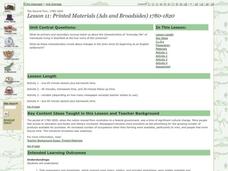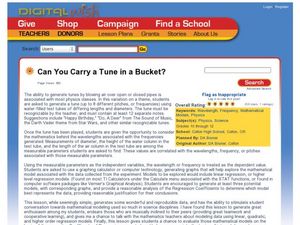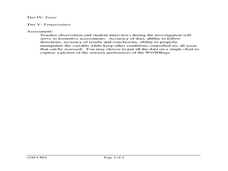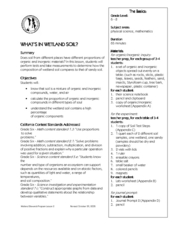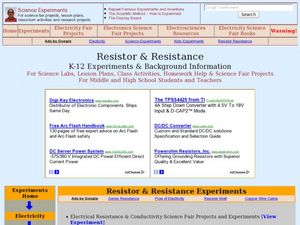Curated OER
Lesson 11: Printed Materials (Ads and Broadsides) 1780-1820
Students use primary resources (gazettes, broadsides, advertisements) to consider life at the turn of the 18th century in Deerfield, Massachusetts. They infer observations about life in the nascent United States.
Curated OER
Studying Birds in the Field
This is a well-designed science activity which helps students learn the behavior of different species of birds. Working with partners and in small team, students learn to scientifically observe birds.
Curated OER
BRIDGING THE GENERATION GAP
Students create a hypothesis about the attitudinal differences between generations, test their hypothesis with a survey, chart their findings, and present their answers to the class.
Curated OER
Sowing Seeds: the Beginning of the Fast Plant Life Cycle
Students plant seeds, observe and tend plants. They identify major plant parts, how to germinate and troubleshoot problems with plants; and, that plants need water, light, and soil nutrients to thrive. They create a Plant Growth Data Log.
Curated OER
What Plants Need in Order to Survive and Grow: Soil
Students conduct an experiment to evaluate whether plants need soil to survive and grow. They plant two seeds, one with soil and one without, make predictions, and record and analyze the seed germination results on a worksheet.
Curated OER
Construction Technologies: Construct the Strongest Bridge
Middle schoolers investigate how engineers use different types of bridges for different places. In small groups they design and construct bridges for three different scenarios, and answer a series of investigating questions applied to...
Curated OER
Collecting and Classifying Pollen
Students collect and analyze pollen from different species of plants. In small groups, they classify pollen according to shape, size and physical characteristics. They draw the basic anatomy of flowering plants and create a dichotomous...
Curated OER
Community Research and Action Plan: Economic and Social Rights
Students research human rights problems in their community. They analyze and report on data gathered, and develop an action plan to address problems related to social and economic rights.
Curated OER
Survey Says...
High schoolers examine Iraqi polls concerning the quality of life in their country. After exploring methodologies of taking polls and surveys, the compare and contrast the findings of two surveys. Students develop research questions,...
Curated OER
Solving Inequalities
In this inequalities worksheet, learners solve and graph inequalities. They shade the answer region. Explanations and examples are provided at the beginning of the document. Answers are at the end of the worksheet. This four-page...
Curated OER
Properties of Matter
Students investigate the properties of matter. In this properties of matter lesson, students observe containers of different metals and discuss their properties including density. Students find the density of an unknown metal and of...
Curated OER
The Big Bang-Cosmic Expansion
In this Big Bang worksheet, students are given the equation used to determine the rate at which the universe is expanding according to the Big Bang theory. Students solve 4 problems using this equation. They find the integral for time,...
Curated OER
Can You Carry a Tune in a Bucket?
Learners use water filled pipes to play a tune and consider the mathematics behind the sound waves. In this sound wave lesson, students play a tune with water filled pipes. They create a mathematical model to evaluate the wavelengths and...
Curated OER
Trout Are Made of Trees Crayon Mural
Students recognize that for a trout habitat to be ideal, several components must be present. In this trout lesson, students explore what makes a healthy stream. Students create paintings for a mural of a trout habitat. Students uncover...
Curated OER
The Nature of Science and Technology
Second graders perform a variety of experiments to observe, form conclusions, and make inferences. For this experiment lesson, 2nd graders experiment based on the result of a pre-assessment. Students share what they have learned.
Curated OER
Triangle Midsegment
Learn how to calculate the length and midsegments of triangles. Students differentiate between similar and congruent triangles. They create a spreadsheet with their findings.
Curated OER
What's in Wetland Soil?
Students examine the organic and inorganic components of soil. For this environmental science lesson, students identify the factors that influence soil formation. They collect soil samples, conduct tests, and analyze the results.
Curated OER
Resistor and Resistance
High schoolers explore electrical resistance through various experiments. For this physics lesson, students calculate resistance using a mathematical formula. They explain how colors identify the resistance value of a resistor.
Curated OER
Farming Fantastic Friends
Seventh graders demonstrate scientific inquiry to design and perform an experiment involving Grow Creatures. They participate in a class discussion, and in small groups design an experiment that determines how to change the materials to...
Curated OER
Graphing Inertia: An Oxymoron?
Eighth graders investigate Newton's Law of Inertia in order to create a context for the review of the use of different types of graphs. They practice gathering the data from an experiment and put it into the correct corresponding graph.
Curated OER
Bungee M&M's
Eighth graders experiment with M&M's and a cup attached to a spring to to simulate a bungee jump. They graph the results of the experiment and make predictions for continuing the experiment. They determine the "line of best fit."
Curated OER
Walking the Plank
Eighth graders experiment with a bathroom scale, books and a plank to determine how weight readings change as distance is applied. They graph and interpret the results.
Curated OER
Creating a Bar Graph with a Graphing Program
Students use the S'COOL data base to create a bar graph.
Curated OER
Inquiry into Heat Loss and Insulation
Students design an experiment to test the problem of the porridge in Baby Bear's bowl as being just right while the other porridge was either too hot or too cold. They explain the steps of their experiment and record their observations...


